#Cameroon associations
Explore tagged Tumblr posts
Text
How to Create and Register an Association in Cameroon
Creating and registering an association in Cameroon involves several key steps, including defining the purpose, drafting statutes, holding a constitutive assembly, and submitting the registration dossier. This guide provides detailed instructions and high
Creating and registering an association in Cameroon involves several steps and adherence to specific legal requirements. This guide will walk you through the process and highlight how OpenHub Consulting can assist you at each stage. Step 1: Define the Purpose and Structure of the Association Purpose: Clearly define the mission, vision, and objectives of your association. This will guide all…
0 notes
Photo

YE Sports 2022
Mali's Falaye Sacko stands on the pitch during the African Cup of Nations 2022 group F soccer match between Mali and Mauritania at the Japoma Stadium in Douala, Cameroon, Thursday, Jan. 20, 2022.
(AP Photo/Themba Hadebe) ASSOCIATED PRESS
#themba hadebe#photographer#associated press#ye sports 2022#mali#falaye sacko#african cup of nations 2022#group s soccer match#mauritania#japoma stadium#douala#cameroon#athlete#sports
0 notes
Text
"When Ghana’s parliament voted to decriminalise suicide and attempted suicide in March, Prof Joseph Osafo felt a weight lift from his shoulders.
Osafo, head of psychology at the University of Ghana, had been engaged in a near 20-year battle to abolish the law – brought in by the British – which stated that anyone who attempts suicide should face imprisonment or a fine.
“It was a very good feeling. I felt like a certain burden had been removed. I was extremely elated,” he remembers. “Then the next morning, I realised we had a lot of work to do.”
Four countries decriminalised suicide in just the past year
Ghana is one of four countries to have decriminalised suicide in the past year – Malaysia, Guyana and Pakistan are the others. More could soon follow, which campaigners say is a sign of greater awareness and understanding of mental health. Kenya and Uganda have filed petitions to overturn laws and members of the UN group of Small Island Developing States have committed to decriminalise. Discussions are also being held in Nigeria and Bangladesh.
“There seems to be a domino effect taking place,” says Muhammad Ali Hasnain, a barrister from United for Global Mental Health, a group calling for decriminalisation. “As one country decriminalises suicide, others start to follow suit.”
“It is quite unusual,” adds Sarah Kline, the organisation’s chief executive. “It’s a huge sign of progress and an important step forward for the populations most at risk, as well as the countries as a whole.” ...
A large number of laws were introduced by the British during colonial rule. Suicide was decriminalised in England, Wales and Northern Ireland in the 1960s – it was never criminalised in Scotland...
The results of these punishments can be “devastating” and present “a huge barrier” to addressing the problem, says Natalie Drew, a technical officer with the mental health policy and service development team at the World Health Organization. Health experts and advocates argue that suicide should be treated as a public health issue rather than a crime.
Criminalising suicide denies people the right to access health services and discriminates against them because of something they’re experiencing, Drew adds. Research shows that in countries where suicide has been decriminalised, people can seek help for mental health and rates tend to then decline.
Next Steps
In September, the WHO is due to release a guide on decriminalising suicide for policymakers, with explanations of how countries have managed it...
“[Ghana’s decision] should have an impact on the work ongoing in other countries, especially in the Africa region,” says Osafo. Within the past couple of months, he has set up a mental health working group with representatives from about 20 African countries, and one of the biggest issues on the agenda is decriminalisation of suicide, he says. “Nigeria is active, Cameroon is active … Kenya has joined and is doing fantastic work. We have Uganda. People have been asking us how we did it.”
Since suicide was decriminalised in Malaysia last month, Anita Abu Bakar, founder and president of the Mental Illness Awareness and Support Association (Miasa), has already seen things change. Crisis response teams and helplines are expanding, and money from the mental health budget is being given to organisations who work in the community. “This is the shift we’re so happy to see,” she says. “It was such an archaic law.”
She adds: “I’m a person with lived experience. What does decriminalisation mean to people like me? We feel supported, we feel this conversation can go to a different level. Obviously decriminalisation is not the only way to prevent suicide, but it’s a big one. I’m happy for this progressive move – better late than never. I’m excited to see what happens next, not just for Malaysia but for the rest of us.”"
-via The Guardian, July 20, 2023
#cw suicide#cw sui mention#ghana#malaysia#guyana#pakistan#nigeria#kenya#uganda#cameroon#mental health#mental illness#healthcare access#decriminalization#england#colonialism#good news#cw sui attempt#suicide
397 notes
·
View notes
Text
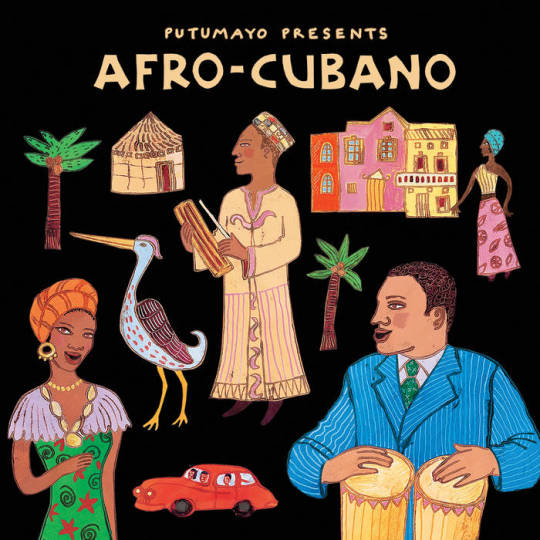
Music of African heritage in Cuba derives from the musical traditions of the many ethnic groups from different parts of West and Central Africa that were brought to Cuba as slaves between the 16th and 19th centuries. Members of some of these groups formed their own ethnic associations or cabildos, in which cultural traditions were conserved, including musical ones. Music of African heritage, along with considerable Iberian (Spanish) musical elements, forms the fulcrum of Cuban music.
Much of this music is associated with traditional African religion – Lucumi, Palo, and others – and preserves the languages formerly used in the African homelands. The music is passed on by oral tradition and is often performed in private gatherings difficult for outsiders to access. Lacking melodic instruments, the music instead features polyrhythmic percussion, voice (call-and-response), and dance. As with other musically renowned New World nations such as the United States, Brazil and Jamaica, Cuban music represents a profound African musical heritage.
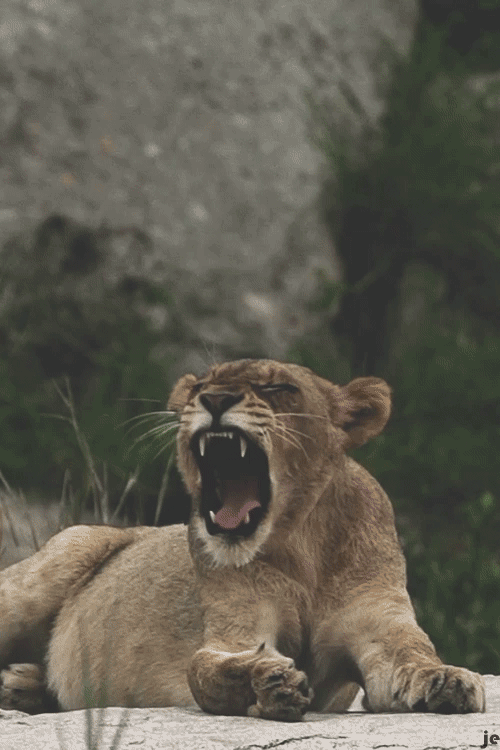
Clearly, the origin of African groups in Cuba is due to the island's long history of slavery. Compared to the USA, slavery started in Cuba much earlier and continued for decades afterwards. Cuba was the last country in the Americas to abolish the importation of slaves, and the second last to free the slaves. In 1807 the British Parliament outlawed slavery, and from then on the British Navy acted to intercept Portuguese and Spanish slave ships. By 1860 the trade with Cuba was almost extinguished; the last slave ship to Cuba was in 1873. The abolition of slavery was announced by the Spanish Crown in 1880, and put into effect in 1886. Two years later, Brazil abolished slavery.
Although the exact number of slaves from each African culture will never be known, most came from one of these groups, which are listed in rough order of their cultural impact in Cuba:
The Congolese from the Congo Basin and SW Africa. Many ethnic groups were involved, all called Congos in Cuba. Their religion is called Palo. Probably the most numerous group, with a huge influence on Cuban music.
The Oyó or Yoruba from modern Nigeria, known in Cuba as Lucumí. Their religion is known as Regla de Ocha (roughly, 'the way of the spirits') and its syncretic version is known as Santería. Culturally of great significance.
The Kalabars from the Southeastern part of Nigeria and also in some part of Cameroon, whom were taken from the Bight of Biafra. These sub Igbo and Ijaw groups are known in Cuba as Carabali,and their religious organization as Abakuá. The street name for them in Cuba was Ñáñigos.
The Dahomey, from Benin. They were the Fon, known as Arará in Cuba. The Dahomeys were a powerful group who practised human sacrifice and slavery long before Europeans arrived, and allegedly even more so during the Atlantic slave trade.
Haiti immigrants to Cuba arrived at various times up to the present day. Leaving aside the French, who also came, the Africans from Haiti were a mixture of groups who usually spoke creolized French: and religion was known as vodú.
From part of modern Liberia and Côte d'Ivoire came the Gangá.
Senegambian people (Senegal, the Gambia), but including many brought from Sudan by the Arab slavers, were known by a catch-all word: Mandinga. The famous musical phrase Kikiribu Mandinga! refers to them.
Subsequent organization
The roots of most Afro-Cuban musical forms lie in the cabildos, self-organized social clubs for the African slaves, and separate cabildos for separate cultures. The cabildos were formed mainly from four groups: the Yoruba (the Lucumi in Cuba); the Congolese (Palo in Cuba); Dahomey (the Fon or Arará). Other cultures were undoubtedly present, more even than listed above, but in smaller numbers, and they did not leave such a distinctive presence.
Cabildos preserved African cultural traditions, even after the abolition of slavery in 1886. At the same time, African religions were transmitted from generation to generation throughout Cuba, Haiti, other islands and Brazil. These religions, which had a similar but not identical structure, were known as Lucumi or Regla de Ocha if they derived from the Yoruba, Palo from Central Africa, Vodú from Haiti, and so on. The term Santería was first introduced to account for the way African spirits were joined to Catholic saints, especially by people who were both baptized and initiated, and so were genuine members of both groups. Outsiders picked up the word and have tended to use it somewhat indiscriminately. It has become a kind of catch-all word, rather like salsa in music.
The ñáñigos in Cuba or Carabali in their secret Abakuá societies, were one of the most terrifying groups; even other blacks were afraid of them:
Girl, don't tell me about the ñáñigos! They were bad. The carabali was evil down to his guts. And the ñáñigos from back in the day when I was a chick, weren't like the ones today... they kept their secret, like in Africa.
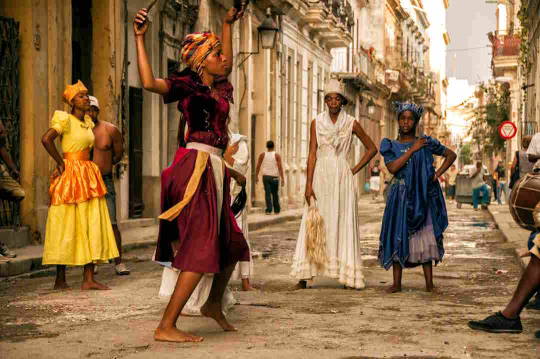
African sacred music in Cuba
All these African cultures had musical traditions, which survive erratically to the present day, not always in detail, but in the general style. The best preserved are the African polytheistic religions, where, in Cuba at least, the instruments, the language, the chants, the dances and their interpretations are quite well preserved. In few or no other American countries are the religious ceremonies conducted in the old language(s) of Africa, as they are at least in Lucumí ceremonies, though of course, back in Africa the language has moved on. What unifies all genuine forms of African music is the unity of polyrhythmic percussion, voice (call-and-response) and dance in well-defined social settings, and the absence of melodic instruments of an Arabic or European kind.
Not until after the Second World War do we find detailed printed descriptions or recordings of African sacred music in Cuba. Inside the cults, music, song, dance and ceremony were (and still are) learnt by heart by means of demonstration, including such ceremonial procedures conducted in an African language. The experiences were private to the initiated, until the work of the ethnologist Fernando Ortíz, who devoted a large part of his life to investigating the influence of African culture in Cuba. The first detailed transcription of percussion, song and chants are to be found in his great works.
There are now many recordings offering a selection of pieces in praise of, or prayers to, the orishas. Much of the ceremonial procedures are still hidden from the eyes of outsiders, though some descriptions in words exist.
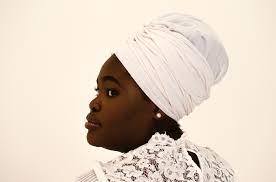
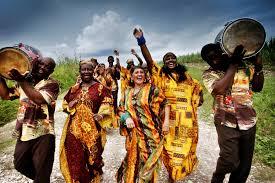
Yoruba and Congolese rituals
Main articles: Yoruba people, Lucumi religion, Kongo people, Palo (religion), and Batá
Religious traditions of African origin have survived in Cuba, and are the basis of ritual music, song and dance quite distinct from the secular music and dance. The religion of Yoruban origin is known as Lucumí or Regla de Ocha; the religion of Congolese origin is known as Palo, as in palos del monte.[11] There are also, in the Oriente region, forms of Haitian ritual together with its own instruments and music.
In Lucumi ceremonies, consecrated batá drums are played at ceremonies, and gourd ensembles called abwe. In the 1950s, a collection of Havana-area batá drummers called Santero helped bring Lucumí styles into mainstream Cuban music, while artists like Mezcla, with the lucumí singer Lázaro Ros, melded the style with other forms, including zouk.
The Congo cabildo uses yuka drums, as well as gallos (a form of song contest), makuta and mani dances. The latter is related to the Brazilian martial dance capoeira
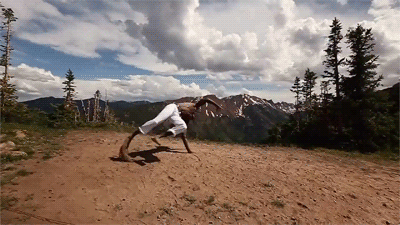
#african#afrakan#kemetic dreams#africans#brownskin#brown skin#afrakans#african culture#fitness#afrakan spirituality#afro cuban music#afro cuban#igbo#yoruba#congo#african music
195 notes
·
View notes
Text

un-invited Halloween guests for lunch
Yégué mask (Ku'Ngang Society) / Cameroon
The Kunggang secret society of the Bamileke is integral to a significant association of healers and leaders, celebrating the cult of the supreme being Si and engaging in agrarian cults through various water and field deities. This society actively promotes fertility and is dedicated to purifying villages from evil sorcerers. The power of the Ku'ngang lies in its role as a bridge between the worlds of the living and the dead, the visible and the invisible, the cosmic and the human realms.
The Ku'ngang Yegue mask, enigmatic and impenetrable, is considered so perilous that it can only be observed from a distance. It features a distinctive array of ornamentation, including a prominent headdress of long black hair designed to conceal the dancer's body. The face is adorned with cowrie shells, and red fabric covers the eyes and mouth openings. The irregularly erected number of horns signifies the owner's rank.
Accompanied by ritual accessories like fetish bags, statuettes, horns, bells, and drums, this mask was used for the ceremonial Ku' dance, reserved for initiates.
Hight: 160 cm
Private Collection
22 notes
·
View notes
Text
dmitri
link to the latest art of dmitri
this post is simply called dmitri, and this is hopefully everything you need to know about them! or just some fun facts lol
(this was sitting in draft since SUMMER, and since there is another rise of ocs in supablr, i thought this would be a good opportunity to revise and post this)
biography
full name: dmitri mikhailovich sokolov
pronouns: he/they
sexuality: bisexual
gender: genderfluid
age: 16 (debut), 17 to 18 (super league junior career), 19 to early 20s (post-super league junior)
birthday: may 23
height: 191 cm/6'3 ft
nationality/citizenship: russian-south african
ethnicity: russian + cameroonian
residence(s): st. petersburg, russia (birthplace), johannesburg, south africa (permanent), toronto, ontario, canada (for uni)
language(s): russian, french, english, afrikaans (fluent in first three, limited proficiency in afrikaans)
significant other: hiram romilly-choucair
family
father: mikhail sokolov
mother: nadine bahanag
sibling(s): matvey (older brother; oldest), avdotya (older sister; middle)
pet(s): squeaky (white maine coon cat)
super league junior profile
team: invincible united junior fc
jersey number: 17
position: midfielder + captain
award(s): rookie of the year, star of the match (x10), slj captain of the year (x2)
post-secondary profile
type: university
location: toronto, ontario, canada
program: fashion design - bachelor of design
varsity sports team: men's ice hockey - goaltender
extracurricular clubs: francophone club, visual arts club, cameroonian student association, literature club
possible future career: fashion designer, fashion journalist, or dressmaker
hobbies and interests
ice hockey
soccer
visual art (won a few high school awards for his artworks)
creative writing
sewing and designing
flute
dance (contemporary ballet)
russian and french literature
cooking (not great at it so they call their sister for help lol)
making mocha
strawberries
extra stuff about his family because they all have interesting lives lol
mikhail (father), he/him
a therapist, specializing in cognitive behavioural therapy and psychotherapy, and is among the best psychologists in johannesburg
did practicum at the oasis, and used to work for cognito fc for a year
ex-ballet dancer from a wealthy (and horrible) classical ballet family in moscow
other interests include dance (for old time sake and to pass on the sokolov techniques to his kids), sudoku, pilates, cooking
nadine (mother), she/her
a corporate lawyer working at one of south africa’s high-ranking law firms
cousin of el matador’s female lawyer (both also attended the same law school)
during her youth, she played defence for the u-18 cameroon's women's national soccer team
other interests include yoga, cardio, playing piano, reading classical books
matvey (brother), he/him
a flute player studying at a prestigious conservatory in london, england
has a huge platform on various social media for showcasing his passion for music
part-time job as a music tutor
other interests include reading philosophical literature, working out, photography, playing ice hockey at a recreational league (defender), dance
avdotya (sister), she/her
a food science major and a culinary enthusiast
was a contestant (two-time champion) at a national (russian) junior chef competition
currently co-president for her university’s culinary club
other interests include painting, playing intramural ice hockey (forward), dance, weightlifting, journaling
squeaky (cat), he/him
a male cat who is very talkative and friendly
was adopted from a shelter in johannesburg at 5 months olds
loves to watch the birds from inside the house, but never chases them if outside
dislikes eating fish itself, will eat if the fish is eaten with something else in the bowl
the kids love hockey and dance sm
#he’s kinda half strikas oc half my own universe oc idk lol#supa strikas#supablr#yanxious ocs: dmitri sokolov#yanxious ocs#supa strikas ocs
15 notes
·
View notes
Text
Please reblog for a bigger sample size!
If you have any fun fact about Cameroon, please tell us and I'll reblog it!
Be respectful in your comments. You can criticize a government without offending its people.
55 notes
·
View notes
Text
Burkina Faso's military junta has announced a ban on homosexual acts, making it the latest African state to crack down on same-sex relations despite strong opposition from Western powers.
Homosexuality was frowned upon in the socially conservative West African state, but it was never outlawed.
Justice Minister Edasso Rodrigue Bayala said the junta's cabinet had now approved legislation to make it a punishable offence, but he did not give further details.
The military seized power in Burkina Faso in 2022, and has pivoted towards Russia after drastically reducing ties with former colonial power, France.
Homosexual acts were decriminalised in Russia in 1993, but President Vladimir Putin's government has been cracking down on the LGBTQ community, including banning what it calls "propaganda of non-traditional sexual relations".
The doctor forced to fight jihadists in Burkina Faso
Nigeria-EU deal sparks false claims over LGBT rights
The Nigerian queer parties that offer liberation
Burkina Faso's decision to outlaw homosexual relations is part of an overhaul of its marriage laws.
The new legislation, which still needs to be passed by the military-controlled parliament and signed off by junta leader Ibrahim Traoré, only recognises religious and customary marriages.
"Henceforth homosexuality and associated practices will be punished by the law," the justice minister was quoted by AFP news agency as saying.
Capt Traoré took power in September 2022 after overthrowing another military ruler, Lt Col Paul-Henri Damiba, accusing him of failing to quell an Islamist insurgency that has gripped Burkina Faso since 2015.
Burkina Faso was among 22 out of 54 African states where same-sex relations were not criminalised.
Unlike in many former British colonies, it did not inherit anti-homosexuality laws after independence from France in 1960.
Muslims make up around 64% of Burkina Faso's population and Christians 26%. The remaining 10% of people follow traditional religions or have no faith.
Many African states have been taking a tougher stand against the LGBTQ community in recent years.
Uganda is among those that have adopted legislation recently to further crack down on the community, despite strong condemnation from local rights groups and Western powers.
In May, its Constitutional Court upheld a tough new anti-gay law that allows for the death penalty to be imposed for “aggravated homosexuality”, which includes having gay sex with someone below the age of 18 or where someone is infected with a life-long illness such as HIV.
Activists said they would appeal against the ruling.
The World Bank has halted new loans to President Yoweri Museveni's government while the US has stopped giving Ugandan goods preferential access to its markets, following the adoption of the legislation last year.
Mr Museveni defended the legislation as preserving traditional family values, and said Uganda would not allow the West to dictate to it.
The daughter of Cameroon's president drew mixed reaction after she came out as a lesbian last week.
Brenda Biya, who lives abroad, said she hoped that her coming out would help change the law banning same-sex relations in the country.
Cameroon has been ruled with an iron-hand by her 91-year-old father, Paul Biya, since 1982.
In Ghana, parliament passed a tough new bill in February that imposes a prison sentence of up to three years for anyone convicted of identifying as LGBTQ+.
However, President Nana Akufo-Addo has not signed it into law, saying he will wait for the courts to rule on its constitutionality.
The finance ministry has warned him that if the bill became law, Ghana could lose $3.8bn (£3bn) in World Bank funding over the next five to six years.
Ghana is suffering a major economic crisis and received a bailout from the International Monetary Fund (IMF) last year.
15 notes
·
View notes
Text
What do i think about when a country is mentioned or what do I associate it with
Algeria - Sahara desert
Angola - thumb pianos, Luanda being an incredibly expensive place to live
Benin - dahomey, voodoo
Botswana - diamonds and the fact that it has been called the success story of Africa
Burkina Faso - Ouagadougou formerly called upper volta.
Burundi - drums used during a revolution there. Gorillas
Cabo Verde - the shape of the country is like a ring of islands all around another island
Cameroon - soccer, limnically active lakes
Central African Republic - the French language
Chad - Lake Chad, Taureg People particularly the blue headscarves
Comoros - Anjouan Moheli and Grand Comore. Has had lots of coups
Congo DRC - my sister is into epidemiology so she talks about it a lot.
Congo - across a river from Brazzaville is Kinsasha
Cote d'Ivoire - Chocolate and the flag is the reverse of ireland
Djibouti - Lake Assal
Egypt - the pyramids
Equatorial Guinea - Spanish speaking, usually the country I use to explain why GDP per capita can be skewed.
Eritrea - architecture influenced by italy
Eswatini - I once got it confused with Switzerland, there's a holiday called Incwala
Ethiopia - a book I read a kid called "children just like me" also pizza hut, weddings, raw beef.
Gabon - oil and the fact that they have places called ogooue
Gambia - the shape and Yaya Jammeh
Ghana - also soccer, Elmina Castle
Guinea - One of the countries my sister knows a lot about
Guinea-Bissau - hippos
Kenya - Jeff
Lesotho - mountains
Liberia - my sister does a great impression of the I'm Liberian meme. Ebola, Ebola in town, don't touch your friend
Libya - Gaddafi, Has a much better flag now. A transit point in human smuggling.
Madagascar - vanilla
Malawi - perch
Mali - Houses built out of mud, west African Islamic architecture.
Mauritania - slavery, I watched a lot of videos during quarantine about modern day slavery.
Mauritius - hinduism
Morocco - markets and tangines
Mozambique - Cabo Delgado
Namibia - San People
Niger - The coup, the orange dot on the flag
Nigeria - Boko Haram
Rwanda - Rwandan Genocide
Sao Tome and Principe - water access for some reason
Senegal - I think this one YouTuber I watch is from there
Seychelles - Hetalia
Sierra Leone - Civil War
Somalia - it's shaped like a music note
South Africa - Vuvuzelas
South Sudan - Francis Bok
Sudan - There are more pyramids here than in Egypt
Tanzania - zanzibar
Togo - for here or Togo meme. I'm sorry Togo I know nothing about you
Tunisia - Arab spring
Uganda - Mr. Moseby
Zambia - the shape of the country reminds me of a fetus. There is also some really cool waterfalls I think, not sure.
Zimbabwe - Mugabe
9 notes
·
View notes
Text
The Russian State Duma has introduced a bill to ban the adoption of Russian children by citizens of countries where gender transitions are legal.
What countries would be affected?
The ban would affect not just E.U. member states but also countries like Bolivia, Bhutan, Kyrgyzstan, and Pakistan, among others. However, according to an explanatory note attached to the bill, the restrictions are primarily aimed at NATO countries.
What countries would be left?
Judging by a report from the International Lesbian, Gay, Bisexual, Trans and Intersex Association (ILGA), as of 2020, there were 39 countries whose laws would likely exempt them from Russia’s proposed ban. Most of these countries are in Africa, South America, and Asia.
Algeria
Benin
Burundi
Cameroon
Democratic Republic of the Congo
Egypt
Gambia
Liberia
Morocco
Nigeria
Rwanda
Tanzania
Tunisia
Uganda
Jordan
Myanmar
Brunei
Oman
Philippines
United Arab Emirates
San Marino
Bahamas
Belize
Dominica
El Salvador
Grenada
Haiti
Honduras
Nicaragua
Kiribati
Marshall Islands
Tonga
Vanuatu
Kuwait
Malawi
Indonesia
Malaysia
Lebanon
South Sudan
Do citizens of these countries currently adopt many Russian children?
None, at least according to official statistics. In 2023, foreign citizens are recorded as having adopted just six children from Russia; in five cases, the parents were Italian citizens, and in one case, they were French citizens. Both Italy and France allow gender transitions.
In its summary of last year’s adoptions by foreigners, the Russian Supreme Court mentions 16 cases; however, in the 10 cases not included in official statistics, the adopting parties were the children’s stepfathers. Their citizenship was not included in the summary due to privacy laws, but the proposed amendments would not affect them regardless of citizenship, because the process of adoption by stepparents is regulated by different legislation.
Only six in total? Were adoptions by foreigners more common before the war?
Yes, though the adoption rate of Russian children by foreign parents began to fall as early as 2012, when Russia banned the adoption of Russian children by U.S. citizens. In 2012, foreign citizens adopted 2,604 Russian children; in 2019, they only adopted 240.
13 notes
·
View notes
Text

On this day in 2021...
R.I.P.
Go well … you have fulfilled your purpose 💕https://www.patreon.com/RunokoRashidi
RUNOKO RASHIDI
Runoko Rashidi is an anthropologist and historian with a major focus on what he calls the Global African Presence--that is, Africans outside of Africa before and after enslavement. He is the author or editor of twenty-two books, the most recent of which are My Global Journeys in Search of the African Presence, Assata-Garvey and Me: A Global African Journey for Children in 2017 and The Black Image in Antiquityin 2019. His other works include Black Star: The African Presence in Early Europe, published by Books of Africa in London in November 2011 and African Star over Asia: The Black Presence in the East, published by Books of Africa in London in November 2012 and revised and reprinted in April 2013, Uncovering the African Past: The Ivan Van Sertima Papers, published by Books of Africa in 2015. His other works include the African Presence in Early Asia, co-edited by Dr. Ivan Van Sertima. Four of Runoko's works have been published in French.
As a traveler and researcher Dr. Rashidi has visited 124countries. As a lecturer and presenter, he has spoken insixty-sevencountries.
Runoko has worked with and under some of the most distinguished scholars of the past half-century, including Ivan Van Sertima, John Henrik Clarke, Asa G. Hilliard, Edward Scobie, John G. Jackson, Jan Carew and Yosef ben-Jochannan.
In October 1987 Rashidi inaugurated the First All-India Dalit Writer's Conference in Hyderabad, India.
In 1999 he was the major keynote speaker at the International Reunion of the African Family in Latin America in Barlovento, Venezuela.
In 2005 Rashidi was awarded an Honorary Doctorate degree, his first, by the Amen-Ra Theological Seminary in Los Angeles.
In August 2010 he was first keynote speaker at the First Global Black Nationalities Conference in Osogbo, Nigeria.
In December 2010 he was President and first speaker at the Diaspora Forum at the FESMAN Conference in Dakar, Senegal.
In 2018 he was named Traveling Ambassador to the Universal Negro Improvement Association & African Communities League RC 2020.
In 2020 he was named to the Curatorial and Academic boards of the Pan-African Heritage Museum.
He is currently doing major research on the African presence in the museums of the world.
As a tour leader he has taken groups to India, Australia, Fiji, Turkey, Jordan, Brazil, Egypt, Ghana, Togo, Benin, France, Belgium, England, Cote d'Ivoire, Namibia, Ethiopia, Kenya, Mexico, Guatemala, Belize, Peru, Cuba, Luxembourg, Germany, Cameroon, the Netherlands, Spain, Morocco, Senegal, the Gambia,Guinea-Bissau,Vietnam, Cambodia, Thailand and Myanmar.
Runoko Rashidi's major mission in life is the uplift of African people, those at home and those abroad.
For more information write to [email protected] or call (323) 803-8663.
His website is www.drrunoko.com
6 notes
·
View notes
Text



Kylian landed at 3pm in Cameroon, he then went to visit the kids that are part of the Association for the fight against hearing impairment in Cameroon (ALDAC).
51 notes
·
View notes
Text
A RISING GLOBAL ADVOCATE FOR HUMANITY AND SOCIAL CHANGE
Ambassador Sean Bardoo the Human Rights Ambassador for HRH Queen Maria Amor also known as the "Traveling Queen of the World," has emerged as one of the fastest-rising public figures, combining celebrity influence with a powerful global commitment to humanitarian efforts. His dedication to humanity is not only evident in his personal life but also in his public service work, which spans multiple continents and numerous causes.

Ambassador Sean Bardoo
Ambassador Sean has made it his mission to help countries and communities across the globe, that are in critical need of assistance with a special focus on vulnerable populations, such as orphans in Uganda, Africa and other areas of the world like Malawi, Guyana, & Dominican Republic.
In addition, he is also a human & sex trafficking expert and works tirelessly to end modern day slavery through education, policy and human rights advocacy break the chains to freedom of torture, abuse & exploitation of humans. He has spoken and presented at several forums globally such as at the Makerere University, Northeastern University & the American Bar Association International Law- Comparative International Responses to Combatting the Crime of Human Trafficking.
His efforts have brought about real change, as he spearheads impactful projects, such as building libraries across the world. Where that includes a significant book drive initiative for education in the country of Cameroon. Leveraging his personal influence, he has collected thousands of books that will be shipped to a bilingual school in Cameroon, providing access to education and knowledge in a region where resources are often limited.

Ambassador Sean Bardoo Visits Uganda

Teenage Mother's Project Uganda
His humanitarian work doesn’t stop there. Ambassador Bardoo has also launched a “Laptop Project for Humanity” in collaboration with the We Care For Humanity (WCH) in Uganda and Kenya. This initiative donates computers to assist students in underdeveloped areas, giving them the tools to improve their education and future prospects. His efforts have already made a significant difference in the lives of many, as these projects bridge gaps in access to technology and learning.
Ranked among the world’s most admired public figures—alongside the likes of Prince Harry and Meghan Markle—Ambassador Bardoo joins a growing list of influential humanitarians making a global impact. Similar to the efforts of Malala Yousafzai, who advocates for girls’ education globally, and climate activist Greta Thunberg, Bardoo’s work transcends borders, embodying a shared vision of global progress and human rights advocacy.

Prince Harry and Meghan Markle
His actions resonate with those of world leaders like former U.S. President Bill Clinton, whose Clinton Foundation has championed global health initiatives, and Oprah Winfrey, whose philanthropy continues to support education and leadership development across the world.

42nd U.S. President Bill Clinton
Ambassador Bardoo has even taken his advocacy to the United Nations, supporting the global development of essential needs for humanity. His legal training and status as a fashion icon further enrich his contributions, allowing him to inspire others through both his professional and philanthropic endeavors.
For Ambassador Bardoo, humanity is not just a career—it is a calling. He believes that material possessions hold little value after death, but love, compassion, and kindness toward others are the lasting legacies that transcend life. His philosophy of serving mankind with heart and purpose is a message that continues to resonate around the world.
Written By: Mohammad Razza - Reporter of Dubai Royal News
3 notes
·
View notes
Text
Not so easily swapped with and other thoughts on racebending
When it comes to racebending characters and the like, there are cases where they can’t be easily racebent. Consider how something like Death Note built on animism, as Japan is predominantly animist, that if you were to make all the characters Cameroonian you’d also have to change the underlying religious subtext as Cameroon has a substantial Christian population. You’d get Witch Note instead with Light and Misa using demonic familiars to get to where they are, committing acts of witchcraft so alarming that a detective like L is sent to investigate those cases. I have thoughts of racebending the Death Note characters, but transporting the characters to Cameroon involves adjusting them to its particular cultural and religious context.
A Mortal Kombat that’s actually made by Asians and Asian Americans would have a more intimate relationship with Asian cultures, histories and philosophies in a way regular Mortal Kombat would never have, it would also be a Mortal Kombat that’s much less orientalist as this would be built on the lived experiences of the programmers and game developers supposing if they’re actually Asian or Asian American themselves. The Superman stories, with its immigrant undertones, would turn out very differently if its creators were indigenous Americans. Turning Superman into somebody who’s indigenous American effectively undoes or cancels the character’s association with immigration, especially if you have entire communities indigenous to the Americas for centuries and even millennia.
I’m pretty much addressing stories and characters where they can’t be easily race-swapped due to the underlying cultural contexts they take place in, especially if it’s particular to certain communities and cultures that can’t be easily exported onto others. Then there are characters that are rarely ever racebent, not necessarily so much due to an intrinsic quality, but rather certain communities and people project a lot onto them. Racebending Felicity Smoak is far less common than racebending Jason Todd and Tim Drake, in part because so many white women project themselves onto her that makes racebending her usually unexplored in fandom. It would also make a canonically racebent Felicity even more controversial because they project a lot onto her.
Or for another matter, Superman, where there’s a tendency to uphold him and his cousin as white American in a way Pete Ross, Lana Lang, Lois Lane and Jimmy Olsen don’t get to be. They could easily be European immigrants and still be accepted as American, which is kind of racist not just to nonwhite immigrants but also to indigenous Americans themselves. And why reimagining Superman to be indigenous is practically impossible given the context and how white people project themselves a lot onto Superman and Supergirl. There was one Japanese American actor who played Superman before, but he’s the exception to the rule.
So in Superman’s case it’s a combination of something intrinsic to how he’s conceived that can’t be easily adapted to indigenous communities and also white people projecting a lot onto him, so sometimes certain characters can’t be easily racebent due to these two factors working together. It is possible but not particularly easy and smooth.
#jason todd#tim drake#felicity smoak#racebending#superman#death note#supergirl#arrow#arrowverse#mortal kombat
3 notes
·
View notes
Text
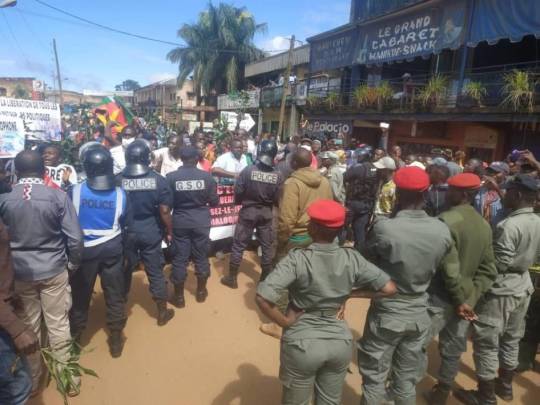
(Nairobi) – A declaration by Cameroon’s territorial administration minister to make two opposition coalitions illegal is part of a government crackdown on opposition and dissent, Human Rights Watch said today.
On March 12, 2024, the minister, Paul Atanga Nji, said in a statement that the Political Alliance for Change (Alliance politique pour le changement, APC), led by Jean-Michel Nintcheu, and the Political Alliance for Transition in Cameroon (Alliance politique pour la transition, APT), led by Olivier Bile, are “illegal,” calling them “clandestine movements.” The minister also referenced a recent meeting at a prison in Yaoundé between Nintcheu and Sisiku Julius Ayuk Tabe, a leader of the Anglophone separatist group Ambazonia Interim Government, as a factor in the decision to ban the coalition.
“The government’s move against these coalitions shows how the Cameroonian authorities are moving to close down space for the opposition and for public debate ahead of the 2025 presidential elections,” said Carine Kaneza Nantulya, deputy Africa director at Human Rights Watch. “The authorities should immediately lift the ban and allow opposition parties to continue working without harassment.”
In December 2023, a prominent opposition leader, Maurice Kamto, was reelected as the leader of the Movement for the Renaissance of Cameroon (Mouvement pour la renaissance du Cameroun, MRC), one of the most prominent opposition groups in the country. Kamto used his reelection to announce the creation of the APC.
The current president, Paul Biya, has been in power since 1982 and is serving out his seventh term. Biya, 91, was last reelected in 2018 after a contested vote-counting process. Kamto challenged the official results and declared himself winner of the election.
Biya’s 2018 election sparked a wave of political repression. After the 2018 vote, opposition-led protests occurred across the country, and the government responded with a heavy crackdown and the use of excessive force by the police, army, and gendarmes. In January 2019, Kamto and over 200 of his supporters were arrested and detained. Kamto was charged with insurrection, hostility against the homeland, criminal association, threats to public order, rebellion, and inciting insurrection, crimes that can carry the death penalty. He was freed on October 5, 2019, and the charges were dropped, though the crackdown on the opposition continued. (Human Rights Watch)
4 notes
·
View notes
Note
Obviously I don’t know if Kylian is in tune with his Cameroonian and Algerian roots. From the looks of it he’s really not, then again I truly don’t know. But I hope this trips inspires him to get in touch with his cultures. Cause I’m sure Algeria and Cameroon will always have his back, even though he doesn’t play for the National teams. It goes beyond that because he’s from that land yk. If I were either of those countries I’d be proud because someone who’s so great comes from the same place as me yk.
I think anyone with right brain cells would be proud to have someone like him associated with their country. I know I definitely would!
I don’t think he really is connected to his roots. It doesn’t seem like it. I haven’t seen him speak about them directly. He has always said that he is French, which he is. As far as i know, France isn’t very known on promoting the heritage of people with non-french origins (I may be wrong). If you’re born in France, you’re French (unless you do something bad, then not).
I hope it will inspire him to venture deeper into his origins. To learn more about the lands of his ancestors. As far as I know, he is very much loved in these countries, and people consider him as part of their own kin. At least he has a place where he will always be welcomed and loved. It’s a very beautiful sight to see him connect to his origins, one way or another. Cameroon and Algeria are very beautiful countries, he is lucky to be able to have the chance to call these countries in some ways his ‘home’.
10 notes
·
View notes